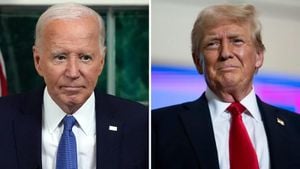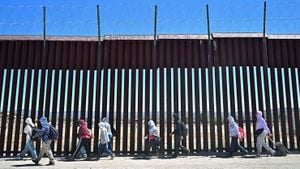World leaders are expressing significant concern over President-elect Donald Trump’s latest tariff proposals, which he claims will curb the flow of fentanyl and other drugs from Canada and Mexico, bolster U.S. national security, and revive American jobs. On his social media platform, Trump announced plans to impose hefty tariffs starting on his first day back in office. Specifically, he’s targeting all goods from Canada and Mexico with a 25 percent tariff, alongside a 10 percent levy on Chinese goods, which already bear some financial strain from earlier tariffs during Trump’s first presidency.
The global reactions have largely been cautious, with many aiming to decipher the long-term impacts of Trump’s tariffs. Canadian Prime Minister Justin Trudeau wasted no time connecting with Trump after the announcement. He referred to their conversation as productive, but the underlying concerns remained palpable.
Doug Ford, the Premier of Ontario, mirrored this discontent, characterizing the tariffs as “a family member stabbing you right in the heart.” The sentiment among Canadian officials was universally worried, with representatives voicing the view of potential devastation to jobs and workers across both nations. More than 60 percent of U.S. crude oil already flows across the border from Canada. Therefore, Ford’s remarks hinted at the precariousness of interdependency between the two countries.
Mexican officials were not far behind in voicing their alarm over Trump’s declared intentions. The potential economic fallout from such tariffs could complicate established trade relationships, especially considering Mexico’s role as one of the primary trade partners with the United States.
Meanwhile, various economic analysts caution about the repercussions of Trump's tariff policies. Their concern centers around the risk of initiating retaliatory tariffs, something they have witnessed during Trump's previous term, which only led to higher prices for consumers. Economists argue these actions often backfire, influencing domestic expenditure negatively.
Despite these warnings, Trump remains steadfast, asserting firm measures are needed to tackle the flow of illicit drugs and secure U.S. borders. The reaction from China has been particularly pointed, as it warns retaliatory measures against U.S. exports should tariffs materialize. Chinese spokespeople indicated the tariffs could worsen trade relations, asking for sensible dialogue to prevent escalation.
Trump's decision to leap back to tariffs as his first order of business harkens back to his earlier policies, which saw mixed outcomes. While some industries favor such measures, especially manufacturing sectors, detractors assert these policies typically inflate prices for consumers, undermining the objectives initially proposed.
Aside from economic repercussions, there’s also significant apprehension about how these tariffs could affect national security collaborations. Experts relay worries about punitive measures jeopardizing cooperative frameworks with allies, especially when it concerns drug trafficking and organized crime.
Overall, the consensus from various sectors—including government officials, analysts, and public leaders—is one of urgency and anxiety. Countries like Canada and Mexico are left pondering potential countermeasures, assessing their next steps to safeguard their economic interests and diplomatic relationships as Trump steps back onto the global stage.
The looming threat of tariffs is anticipated to evolve as incoming policymakers assess Trump’s visitations and responses globally. Experts will be watching closely to see how both friends and foes might navigate the choppy waters of international trade amid President Trump’s unyielding bravado.



